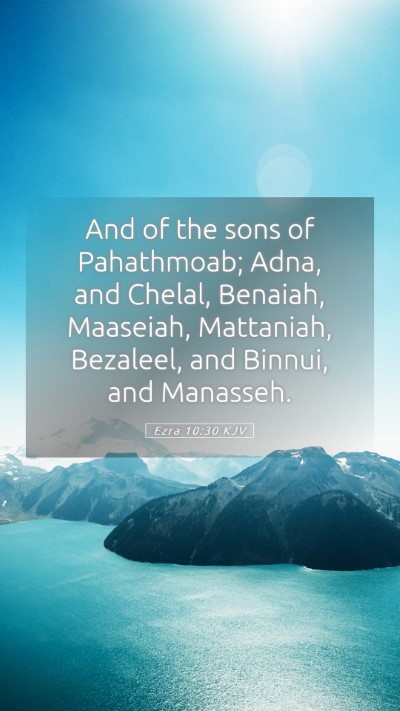Understanding Ezra 10:30
The verse Ezra 10:30 is a crucial part of the narrative involving the return of the Jewish exiles to Jerusalem
and their need to address issues of intermarriage with foreign nations. This scripture reflects on the ongoing
challenges faced by the Jewish community in their efforts to restore their identity and adherence to God's laws.
Bible Verse Explanation
Ezra 10:30 states: "And of the sons of Ahab, Zecariah the son of Jehohanan." This brief mention highlights
the descendants of a particular Israelite lineage that faced scrutiny and exclusion during a critical
time of Judah's history.
Contextual Background
To fully grasp the meaning of this verse, it is essential to place it within the broader historical context
of the post-exilic period. After the Babylonian captivity, Ezra led a group of exiles back to Jerusalem
to re-establish the worship of Yahweh. The primary concern was to restore the covenantal relationship
between God and His people, which included making significant reforms, particularly concerning marriages
to non-Israelites.
Bible Verse Commentary
-
Matthew Henry:
Henry emphasizes the importance of maintaining a pure lineage among the returned exiles. The
text illustrates how closely kinship and religious faith were tied, and any deviation from these
standards was seen as potentially jeopardizing the community's fidelity to God.
-
Albert Barnes:
Barnes notes that this lineage represents a remnant of Israel that had been involved in prior
disobedience. By naming specific individuals, it serves as a reminder of the need for accountability
among the people in restoring their identity and commitment to divine law.
-
Adam Clarke:
Clarke interprets the verse in light of communal identity, suggesting that the reference to Zecariah
signifies a turning point where the descendants were to be held to a higher standard of faithfulness
and devotion to God. The focus is on the need to separate from foreigners who led them astray from
true worship.
Application and Insights
For modern readers, Ezra 10:30 serves as a poignant reminder of the significance of community purity and
the spiritual repercussions of intermingling with practices contrary to one's faith. This verse can be
applied to daily life by encouraging individuals to examine the influences they allow into their lives,
ensuring that they align with their values and faith.
Lessons for Bible Study Groups
-
Bible study topics: Focus on the theme of community and faithfulness in the face of
cultural pressure, using Ezra's reforms as a case study.
-
Online Bible study: Engage in discussions about historical context and its application
in contemporary faith practices, making the scripture relatable to current situations.
-
Bible study guides: Utilize the insights from public domain commentaries to enhance
understanding and group discussions.
Cross References
This verse connects with several other scriptures that illuminate similar themes:
- Nehemiah 10:28-29 - Discusses the covenant made by the people to separate themselves from foreign influences.
- Exodus 34:12-16 - Warns against making covenants with the inhabitants of the land, stressing the
importance of remaining faithful to God.
- 2 Corinthians 6:14 - Encourages believers to not be unequally yoked with unbelievers, reflecting on
the theme of unity in faith.
Conclusion
In summary, Ezra 10:30 provides profound insights into the necessity for Israel to preserve its
identity in a time of spiritual renewal. Through careful interpretation and contextual study, this
verse speaks to the challenges faced by faith communities in maintaining their beliefs amidst external influences.
Such scripture analysis can yield valuable Bible study insights for those seeking deeper understanding and
practical applications of biblical teachings in their lives.


